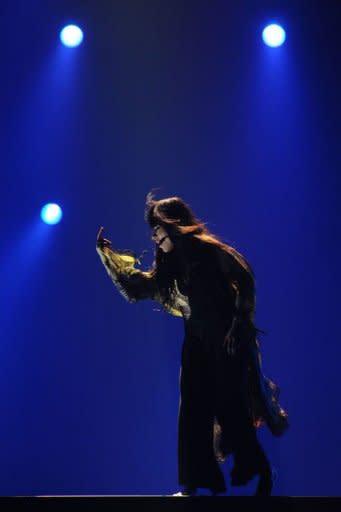Sweden euphoric after fifth Eurovision win
Swedes were euphoric on Sunday after singer Loreen clinched the country's fifth Eurovision crown, beating rivals including a group of Russian grannies in the glitzy annual song contest. Favourite Loreen wowed voters with her catchy techno-pop number "Euphoria", crushing the competition as she notched up the maximum 12 points from judge after judge. Russia's singing grannies had to content themselves with second place but won the hearts of millions, including President Vladimir Putin who on Sunday sent his congratulations and promised to pay a visit to their village soon. Putin is "delighted by the talent and gusto shown by the Babushki in the contest" in the Azerbaijani capital Baku, his press service said in a statement quoted by Russian news agencies. "Vladimir Putin intends soon to personally meet the Babushki during a trip to Udmurtia and visit their village," the statement added. Hosts Azerbaijan put on a four-hour extravaganza that it hoped would bolster its image despite concerns over human rights violations under the autocratic rule of the Aliyev dynasty. Loreen's victory was the fifth for Sweden and followed in the footsteps of its most famous band Abba who won the contest in 1974 with "Waterloo" -- for many the song that defined the kitschy contest for all time. "It's just a question of taste. This year it happened to me," was how Loreen, whose real name is Lorine Zineb Noka Talhaoui, modestly explained her victory with 372 points. Pictures of the 28-year-old daughter of Berber immigrants from Morocco draped in her country's yellow and blue flag were splashed across newspapers in Scandanavia on Sunday after Swedes celebrated through the night. "Loreen is a Swedish hero," cheered one jubilant fan Steffan Janemyr as Swedes thronged into Stockholm's central Sergel square. "It's the best song ever to have won Eurovision." Foreign Minister Carl Bildt tweeted: "Yes, Loreen certainly lived up to high expectations." The Russian grannies, a choir of elderly village women aged up to 76 who performed a disco song "Party for Everybody" in English and their local Finno-Ugric language, were delighted to be runners-up. "There are tears of joy. The Babushki are so happy with their success," band administrator Maria Tolstukhina told Interfax, adding that their earnings would be spent on building a new church in their native village of Buranovo. The show included the usual mix of the weird and exotic including a Norwegian rapper of Iranian origin who came last, half-naked French gymnasts and Irish duo Jedward who ended the routine by getting drenched by a fountain. There was disappointment for Britain after veteran crooner Engelbert Humperdinck -- brought in to revive its notoriously bad Eurovision fortunes -- scored just 12 points and came second last with his ballad "Love Will Set You Free". Voting was marked by the usual backslapping geo-political patterns with the Greeks voting for the Cypriots and vice versa. The final's 26 acts lit up the Crystal Hall built on the Caspian Sea in barely six months, with an audience of some 20,000 inside the venue and 100 million television viewers. Loreen ran into controversy in Azerbaijan by meeting local rights activists who briefed her on the lack of democratic freedoms in the tightly controlled ex-Soviet state. However at the post-contest news conference she sidestepped a question about how she would support the people of Azerbaijan further, saying simply: "I will support the Azerbaijan people from my heart." In Baku the festive atmosphere had been clouded by the detentions of dozens of opposition activists who attempted to hold peaceful demonstrations calling for democratic freedoms. Azerbaijan is run by strongman President Ilham Aliyev, who succeeded his late father Heidar Aliyev in 2003. His wife Mehriban Aliyeva headed the Eurovision organising committee and his son-in-law, Emin Agalarov, a Moscow-based businessman with a budding pop career, sang in a black leather jacket in a musical interlude after the voting. With political sensitivities never far from this Eurovision, promotional videos shown included landscapes from Nagorny Karabakh, which Armenian separatists backed by Yerevan seized from Azerbaijan in a 1990s war. Armenia had pulled out of the contest saying it feared hostile treatment.



